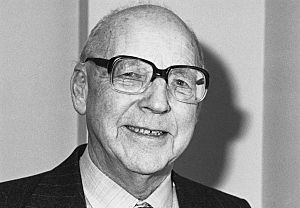Frederick Dainton, Baron Dainton facts for kids
Quick facts for kids
The Lord Dainton
|
|
|---|---|

Dainton, 1990s
|
|
| Member of the House of Lords | |
| In office 1986–1997 |
|
Frederick Sydney Dainton (born November 11, 1914 – died December 5, 1997) was a very important British chemist and a leader in universities. He was also known as Baron Dainton.
He studied at famous universities like Oxford and Cambridge. Later, he became a professor at the University of Leeds. He also served as the Vice-Chancellor (a top leader) at the University of Nottingham. He was even the Chancellor of the University of Sheffield.
Contents
Early Life and School Days
Frederick Dainton was born in Sheffield on November 11, 1914. He was the youngest of nine children. His father, George Whalley Dainton, worked for a building company.
He won a special scholarship to attend the Central Secondary School in Sheffield. But it was at the public library where he truly fell in love with chemistry. He spent hours reading books by famous chemists like Sidgwick and Hinshelwood.
University Education
Dainton earned a scholarship to St John's College, Oxford. This helped him study chemistry. He did very well, getting a top degree in 1937.
After Oxford, he went to Sidney Sussex College, Cambridge. There, he earned his PhD in 1940. His research focused on photochemistry, which is about how light affects chemical reactions. He worked with a famous scientist named Ronald Norrish.
A Career in Science and Education
Frederick Dainton was very short-sighted, so he could not join the military. Instead, he stayed at Cambridge to teach during the Second World War. In 1945, he became a Fellow at St Catharine's College, Cambridge. This meant he was a senior member of the college.
Understanding Polymers
In 1948, Dainton made an important discovery in polymer chemistry. Polymers are long chains of molecules, like plastics. He explained something called the "ceiling temperature" for certain polymers. This temperature is where these materials start to break down.
Professor and Leader
In 1950, Dainton became a Professor of Physical Chemistry at the University of Leeds. He focused on radiation chemistry, which studies how radiation affects chemicals. His important work led to him being chosen as a Fellow of the Royal Society. This is a very high honor for scientists in the UK.
In 1965, Dainton left Leeds to become the Vice-Chancellor of the University of Nottingham. This role is like being the chief executive of a university.
The Dainton Report
During his time at Nottingham, he led a government study. This study looked into why fewer students were choosing science and technology at universities. The report was published in 1968 and was called The Swing away from Science. It is often known simply as the Dainton Report.
In 1970, Dainton became the Dr Lee's Professor of Chemistry at Oxford. He also became a Fellow of Exeter College, Oxford. Later, in 1973, he became the Chairman of the University Grants Committee. This committee helped decide how much money universities in the UK would receive. He stayed in this role until 1985.
From 1978 until he passed away, Dainton was the Chancellor of the University of Sheffield. He was the first person from Yorkshire to hold this important position.
Awards and Recognitions
Frederick Dainton received many honors for his work.
- In 1957, he was elected a Fellow of the Royal Society (FRS).
- In 1996, he became an Honorary Fellow of the Royal Society of Edinburgh (FRSE).
- He was also elected to the American Academy of Arts and Sciences in 1972.
- In 1991, he joined the American Philosophical Society.
He also received important medals for his scientific achievements:
- The Davy Medal in 1969.
- The Faraday Medal in 1974.
- The first ever President's Medal from the Institute of Physics in 1998.
In 1970, the University of Bath gave him an honorary degree called Doctor of Science (DSc).
In 1971, he was made a Knight. This meant he could be called "Sir Frederick." Later, in 1986, he was given a special title called a life peerage. This made him Baron Dainton, and he became a member of the House of Lords, which is part of the UK Parliament.
Family Life
While at Cambridge, Frederick Dainton met Barbara Hazlitt Wright. She was also a research student, studying zoology. They married in 1942 and were together for 55 years. They had one son and two daughters. Barbara passed away in 2009.
Passing Away
Lord Dainton passed away in Oxford on December 5, 1997. He was 83 years old.
Books by Frederick Dainton
- Science: Salvation or Damnation (1971)
- Doubts and Certainties: A Personal Memoir of the 20th Century (2000)
 | Audre Lorde |
 | John Berry Meachum |
 | Ferdinand Lee Barnett |

